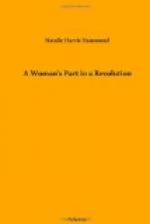About the prisoner F. Gray I wish to make special mention, because he is showing signs of developing melancholia (lunacy), caused by the uncertainty of the future and what he has gone through during the last few months.
I also fear that he later on will develop suicidal tendencies. I would recommend that his sentence should be taken into immediate consideration, and to discharge him at once from the jail.
I have the honour to be, etc.,
GORDON MESSUM, M.D.,
District Surgeon.
Unfortunately this report was not considered, and on the 16th day of May poor Gray, distraught by his sufferings, cut his throat.
Mr. Fred Gray was a man of high business standing. He was married, and the father of six children. His tragic death was a shock to every one. Johannesburg turned out in a body ten thousand strong to carry his remains to the burial-place. Inside the jail, his fellow prisoners had formed in procession and with uncovered heads followed the body as far as the prison gates, the limit of their freedom, not a man with dry eyes.
The first prisoner was liberated.
FOURTH WEEK.—The decision still withheld. President Kruger excuses this by saying it is due to the fact that only half the captive Randites have signed the petition for commuting the banishment and imprisonment clauses to fines.
The suspense is heartbreaking, and night brings no forgetfulness. Those long voiceless nights of South Africa! Not a bird’s call, nor a chirp from the tiny creatures which hide in the grass. A white moon, a wide heaven filled with strange stars, and the tall moon-flowers at the gate lifting up their mute white trumpets to the night wind.
The little boy beside me rouses from his sleep to ask:—’Mother dear, why do you laugh and shake the bed so?’
Fearing an illness, I yearned for a last interview with my husband. It was a Saturday that I went to Pretoria, and although the prison was supposed to be closed on that day to visitors, I had several times gained admittance through the kindness of those in authority. I went to the Landdrost who had the dispensing of permits.
’Will you please make an exception in my favour and allow me to see my husband? I am ill, and must return to my home in Johannesburg at once.’
‘What does she say?’ roared the Landdrost, who for some reason was in a furious temper. He turned to a Boer in the room. ’Tell her she may whine as much as she pleases, she can’t see her husband on Saturday. Nobody can go in the prison on Saturday. If she wants to see her husband she must wait until next Monday!’ The man turned fiercely towards me, but seeing my patient face, or perhaps for the sake of some Boer woman on a distant farm, his voice broke, and became quite gentle as he delivered the message.




